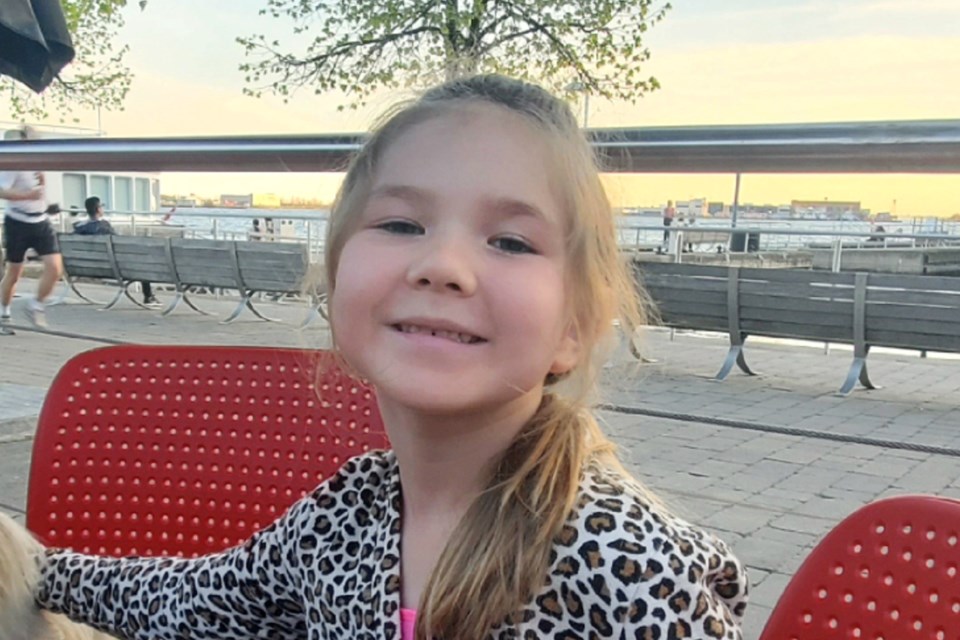THUNDER BAY, Ont. — A six-year-old from Thunder Bay will soon gain a distinction that sets her apart from almost everyone else in the world.
Victoria Lehto's genetic material will be rocketed into deep space next month — tentatively on May 4 — making her what her dad believes is the youngest living person on Earth whose DNA has left the planet.
Ryan Lehto owns Global Genetic Health, a local company established in 2019 that does DNA processing and serves a variety of clients.
One of its services is DNA Memorial, which uses a proprietary process that allows genetic material to be preserved at room temperature without freezing.
It's sold through funeral homes across Canada, the U.S. and overseas.
Genetic Health also does DNA processing for Celestis Inc., a Texas-based space burial company that started sending cremated human remains into space on commercial spaceflights in 1997.
In 2017, Celestis partnered with Lehto's firm to expand this service by putting DNA into space, both from deceased individuals and those still alive.
"Whatever the item is, say it's a tooth or a cheek swab, blood, or hair ... we'll extract the DNA out of that biological material, clean it, then specially preserve it," Lehto said. "We wrap it around these tiny silica beads. When it's done it kind of looks like a really fine powder, but it's really microscopic beads with the DNA attached to it."
Next month, Celestis is scheduled to send a capsule into deep space with the cremated remains or DNA of over 200 people, including hair samples from three deceased U.S. presidents and the genetic material of several legendary actors from the Star Trek series.
Genetic Health processed the DNA of the Star Trek performers at its Thunder Bay facility, located in the Chapples Building on Victoria Avenue.
According to Lehto, Celestis offered to let him include his own DNA on the same mission and waived its fee of about $13,000 U.S.
"I decided to send my daughter's," he said. "I thought it would be just something nice for her to send her DNA out into space, and she gets a certificate and a T-shirt, and will get to watch the launch from Cape Canaveral on a webcast."
Lehto holds a PhD in biotechnology, and previously worked at Lakehead University's Paleo-DNA Lab where he extracted DNA from dinosaur fossils and mummies.
His daughter may be a budding researcher herself, as she already has her own science-oriented YouTube channel, but he expects she won't fully appreciate the significance of her DNA going into outer space until she's a lot older.
In a blog, Celestis Memorial Spaceflights said its upcoming Enterprise flight will establish a solar orbit 150 to 300 million miles in deep space, becoming the first outpost of humanity in the cosmos.
"Off-world DNA storage allows the human genome to be preserved for thousands of years in space without degradation," it said.
"This means it is possible it could be discovered later, like a cosmic 'time capsule.' This could allow future generations to learn more about the U.S. forefathers millennia into the future. Celestis DNA (TM) preserves the entire human genome as a powder, which is then transferred to a Titanium 5 capsule resistant to the extremes of deep space, such as heat, cold, and radiation."
Celestis has purchased a spot for its memorial capsules on the upper stage of a United Launch Alliance Vulcan Centaur rocket that will carry various payloads into space, including a lunar lander to be used in a future NASA expedition.
In addition to cremated remains and DNA, the company will launch messages of hope, poems, pictures, song transcripts, images and drawings on this mission.
Garry Rinne is a veteran in the news business and writes for TBNewsWatch.com.
